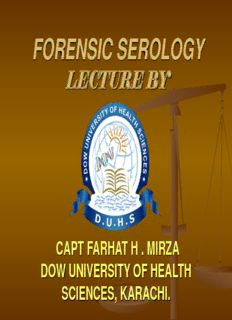
forensic serology PDF
Preview forensic serology
FORENSIC SEROLOGY LECTURE BY CAPT FARHAT H . MIRZA DOW UNIVERSITY OF HEALTH SCIENCES, KARACHI. Study of antigen- antibody reaction, used for the purpose of detection of crime. OR Study of body fluids or parts e.g. blood, semen, saliva, milk, urine, faecal matter, hair etc, used for the purpose of detection of crime. OR Forensic Serology is the study of TRACE EVIDENCE. TRACE EVIDENCE: Edmond Locard, Head of Institute of Criminalistics in university of Lyon in France, put far ward his THEORY OF INTERCHANGE. Also known as, LOCARD’S PRINCIPLE OF EXCHANGE. “Whenever two objects come in contact with each other, always there is some exchange of material from one to the other, which may and may not be visible to the naked eye”. TRACE EVIDENCE: Edmond Locard also proposed that “The person or persons at the scene during the commission of crime will almost always leave something and take something away”. TRACE EVIDENCE: Definition: It’s the material evidence collected from the scene of crime, weapon, wound, body, clothing or belongings of victim or assailant and proves the association of that person to the events occurred at the crime scene e.g. stains of blood, semen, saliva, milk, urine, faeces or recovery of foreign material like hairs, buttons, coins and virtually any thing. BLOOD AS TRACE EVIDENCE: Blood itself is an extremely important entity in medico-legal practice. It can be important trace evidence in cases of : Injuries Murders Sexual Offenses.
Description: